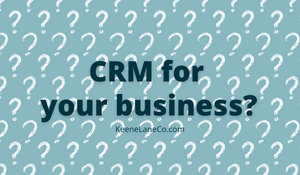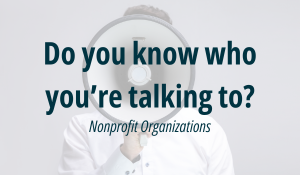At Keene Lane Co., we’ve had the pleasure of working with numerous nonprofit organizations. One...
Nonprofits and Software Solutions Explained
 Nonprofits
Nonprofits
Nonprofits are a vital part of our community and are fundamental in helping shape more equitable and thriving environments. Nonprofits come in many forms (charities, Foundations, donor-based, membership based and more) and the importance of their existence remains the same, in serving to strengthen and positively shape the future through common good.
Nonprofits have been affected significantly the past few years and are realizing the growing challenges with retaining necessary staff, operational funding, community support and more. They have had to adapt and shift their focus to addressing these challenges. In doing so, many nonprofits have effectively leveraged technology to create new processes and efficiencies within their organization to continue to support their mission and the communities they serve.
Software technology tools support backend operations to assist in making work easier for nonprofits, and can support things like: contact management, marketing, sales, content management and service support. Allowing nonprofits to focus on their mission, more easily communicate their impact and do more good.
In this blog we'll breakout 5 tools that can help nonprofits, followed by software considerations and end with a wrap up.
-
Operations and Software Support Breakout
Operations and Software Support Breakout:
1. Customer Relationship Management (CRM) is a process for managing relationships, activities and interactions with customers and contacts.
CRM software allows nonprofits to effectively manage contacts in a database to more easily track, segment and target audiences to communicate directly with relevant content. Audiences can include members, prospective members, donors, partners, investors, grantees and more!
Leveraging this type of dynamic database (versus spreadsheets) allows nonprofits to track interactions, data and notes all in one place. This saves time searching for historical information and provides the ability to view engagement and contact interests for effective decision making, streamlining processes and building relationships.
Learn more about CRM - read our blog ‘12 Questions when considering CRM software for your business’.
2. Marketing refers to actions taken to promote and attract an audience to the organization’s products or services through research, messaging and visual content. Marketing pertains to all aspects of a business and includes many forms of communication and speaking to different audiences. For nonprofits these audiences could include: donors, partners, prospective members, grantees, investors and more.
Marketing software can help support a nonprofit's strategy and the many ways they want to create content and communicate to their network through emails, forms, landing pages, and more, while leveraging workflows and automation tools for simplicity.

3. Sales / Donor & Member Recruitment refers to all activities involved in selling a product or service to a consumer or business. In this case for nonprofits, these could be activities promoting the organization's mission and services to attract donors, members, clients, grantees and partners to the work.
Software support for sales can help track someone’s journey through their initial interest to their final commitment, and provides tools to make that process easier for both the administration and ‘consumer’ side. Some tools include: a sales pipeline, meeting scheduling, membership management and reporting and analytics.

4. Content Management or Content Management System (CMS) refers to software applications that can allow individuals to build, manage, collaborate on and publish a website. Features can include: the website builder, collaboration abilities, search engine optimization (SEO), blogging, social content and content scheduling.
Nonprofits can benefit from user-friendly content management software that integrates with their systems giving them access to their website, blogs, landing pages and more, to be empowered to make changes and leverage the tools themselves.

5. Customer Services refers to helping customers solve problems, educating on products and services and answering questions. Simply put, serving the needs of customers. In this case, for service-based nonprofits this could be helping potential clients interested in your support services, for grant-based foundations this could be helping nonprofits interested in applying for funding, for member-based nonprofits this could help prospects understand your mission to recruit new members.
Software support for customer service can provide resources and tools to make supporting customers administratively easier and clearer on the ‘customer’ end as well. Leveraging tools for service support can take many forms. As an example, self-serve support can be implemented through creating a Q&A page on a website, landing pages with in-depth information addressing specific topics, publishing blog articles to reference or creating online training tools. Some additional tools could be: email, surveys, a ticketing system, phone integration and different types of messaging.

Nonprofit Considerations When Reviewing Software
Selecting a software solution for your nonprofit should involve a strategic approach and should include the following:
- Understanding the organization’s current processes, pain points and goals
- Identifying where the organization would receive the most value-add from a software solution
- Understanding resources and team involvement for execution and ongoing usage
- Anticipating a learning curve and incorporate training
- Having realistic expectations of the software in association to the organization’s needs
- Connecting to the organization’s strategic goals for longevity
- Identifying whether your organization needs implementation and ongoing support, to find the right partner
Develop a strategic plan to include: needs identification, plan design with goals and objectives, implementation and evaluation. Checkout the Keene Lane Co. Roadmap as a reference.
Wrap Up
As nonprofits continue to navigate and adapt to the evolving landscape, finding solutions for operational support is essential. Incorporating a software solution can be an amazing asset when implemented correctly, there’s an investment from the team, a clear action plan connected to organizational goals and the right partner in place.
HubSpot is a scalable all-in-one software solution to grow with nonprofit organizations in this way, and offers a 40% discount to nonprofits. Keene Lane Co. is here to champion the implementation, execution and support process. To learn more about how Keene Lane Co. can help your nonprofit checkout our services and support for nonprofits.
Sincerely,
Katy Keene
Founder and Principal Consultant
Learn more about our services.

jpg.jpg?width=50&name=Katy%20Professional%20Headshot%20(2)jpg.jpg)

/HubSpot%20nonprofits%20300x175.png?height=200&name=HubSpot%20nonprofits%20300x175.png)

